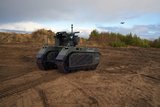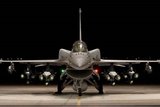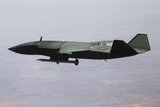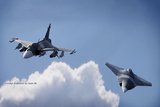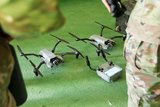US Army awards nearly $6 billion in contracts for CUAS interceptors and UAS systems
The Coyote missile is available in CUAS kinetic and non-kinetic variants. (Photo: Raytheon)
The US Army has awarded around US$6 billion in contracts for counter-uncrewed aerial systems (CUAS) and uncrewed aerial systems (UAS).
A contract worth US$5 billion was given to Raytheon for its Coyote missile interceptors. The deal will include kinetic and non-kinetic interceptors, launchers and Ku-band radio frequency radio systems. The contract has an anticipated completion date of 2033, with work and locations for production still to be determined according to the Defense Security Cooperation Agency (DSCA) notice.
The Coyote missile system will form part of President Trump’s ‘Golden Dome’ multi-layered air defence initiative.
According to Raytheon, the Coyote rail-launched missile
Already have an account? Log in
Want to keep reading this article?
More from Air Warfare
-
![Singapore Airshow 2026: Rafael highlights tailored effector solutions for different operational needs]()
Singapore Airshow 2026: Rafael highlights tailored effector solutions for different operational needs
Shephard spoke with Rafael’s CEO about the company’s effector offerings as well as his perspective on one-way attack drones.
-
![World Defense Show 2026: L3Harris to achieve full-rate production of Viper Shield soon]()
World Defense Show 2026: L3Harris to achieve full-rate production of Viper Shield soon
L3Harris has completed the production candidate software load for its Viper Shield airborne electronic warfare system and is conducting sea trials with its VAMPIRE counter-drone system.
-
![Singapore Airshow 2026: CCA manufacturers eye growing opportunities in Asia-Pacific]()
Singapore Airshow 2026: CCA manufacturers eye growing opportunities in Asia-Pacific
Companies offering collaborative combat aircraft say there is a massive potential for countries adopting the capability in the Asia-Pacific region.
-
![Singapore Airshow 2026: Airbus-RSAF H225M teaming tests point to future scalability]()
Singapore Airshow 2026: Airbus-RSAF H225M teaming tests point to future scalability
The tests between a Republic of Singapore Air Force H225M and Airbus Flexrotor uncrewed aerial system were designed to allow the crew to receive and process real-time data from the UAS while maintaining direct command and control.
-
![Singapore Airshow 2026: Saab eyes “share” in future fighter market, targets 2027 CCA demo flight]()
Singapore Airshow 2026: Saab eyes “share” in future fighter market, targets 2027 CCA demo flight
The Swedish government is expected to make a decision on the next steps of the Future Fighter System Concept programme by 2030, with the current second phase focusing on technology knowledge expansion and demonstration flights.
-
![Singapore Airshow: Red Cat ramps up portfolio development amid “key” APAC opportunities]()
Singapore Airshow: Red Cat ramps up portfolio development amid “key” APAC opportunities
In the wake of its 1,842% year-on-year revenue increase in Q4 2025, Red Cat sees mass opportunities in the Asia-Pacific region as the company eyes an ongoing production increase and market growth.









